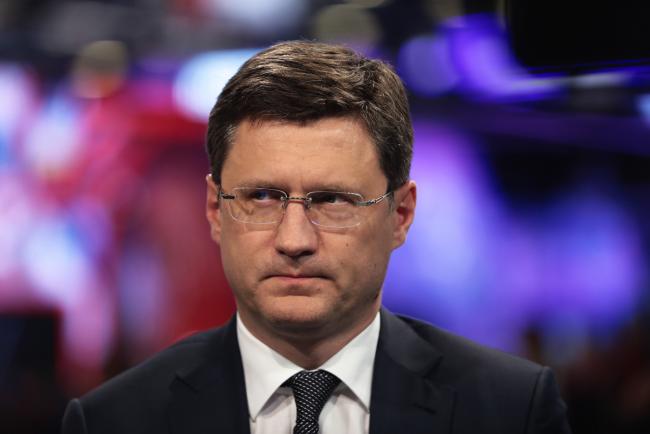 © Bloomberg. Alexander Novak, Russia’s energy minister. Photographer: Simon Dawson/Bloomberg
© Bloomberg. Alexander Novak, Russia’s energy minister. Photographer: Simon Dawson/Bloomberg2/2
(Bloomberg) — Russia will discuss with OPEC in June whether it’s appropriate to gradually scale back oil-output cuts, Energy Minister Alexander Novak said, reiterating that any decision must be guided by the state of the market.
As the minister spoke to reporters at the St. Petersburg International Economic Forum on Thursday, some of Russia’s largest oil producers called for more flexibility after almost 17 months of output curbs. The cuts have achieved their goal and crude prices near $80 a barrel are high enough, said the bosses of Lukoil PJSC and Gazprom (MCX:) Neft PJSC.
The Organization of Petroleum Exporting Countries and its allies have eliminated the oil-inventory surplus that’s weighed on prices since 2014. Even so, they indicated last month that supply curbs should continue as planned until the end of the year. That position has been complicated by renewed U.S. sanctions on Iran and Venezuela’s collapsing oil industry, which threaten to tighten a market where crude is already trading near a three-year high.
“We’ve been repeatedly saying” that all decisions on the future of the deal should depend on the market situation, Novak said. OPEC and its partners will definitely discuss in Vienna next month the possibility of a gradual output recovery, he said.
For the first time in more than five years, Saudi Arabia and other oil producers are feeling the political pressure from consuming nations. U.S. President Donald Trump directed his ire against OPEC last month, saying in a tweet that “oil prices are artificially Very High! No good and will not be accepted!”
Gasoline Costs
In Washington, Democrats are using high gasoline prices, approaching $3 a gallon for the first time since 2014, as a political tool, accusing the White House of not doing enough to shield consumers. In developing countries from Brazil to the Philippines, drivers are complaining about high prices.
After Trump decided on May 8 to reimpose sanctions on Iran’s oil exports, Saudi Energy Minister Khalid Al-Falih assured the market that major producers would work to ensure stability and “mitigate the effects of any supply shortages.” Yet the kingdom has also shown a desire for higher prices to bankroll domestic economic reforms and underpin the valuation of its state oil company in a planned initial public offering.
Oil extended its decline in London after Novak’s comments on Thursday, falling 1 percent to $79.04 a barrel at 4:30 p.m. After briefly rising above $80 on Tuesday, has weakened amid speculation that OPEC and its allies could agree to slightly dial back production cuts, which have been deeper than planned for several months due to losses in Venezuela.
“They’d like to keep the pact together, so there will be some kind of agreement to increase when it’s needed,” Torbjorn Tornqvist, chief executive officer of oil trader Gunvor Group, said in an interview in St. Petersburg. While the market is “relatively balanced,” there are a “tight couple of months ahead,” he said.
Ministerial Meeting
Novak is scheduled to meet this week with his Saudi counterpart and with United Arab Emirates Energy Minister Suhail Al Mazrouei — who currently holds the position of OPEC president. Next week or the week after, the Russian minister plans to meet oil bosses to discuss the deal.
There’s scope for Russia to continue its agreement with OPEC beyond 2018, but “flexibility” must be built into the accord, Lukoil CEO Vagit Alekperov said at a briefing in St. Petersburg.
“We shouldn’t breach the deal but it should become more flexible — follow the market movements,” Alekperov said. “The market has rebalanced” and $80 a barrel is “already high enough.”
Gazprom Neft CEO Alexander Dyukov said in an interview that it would be “right for the deal participants to increase production quotas” to avoid overheating the market.
(Updates with comments from Gunvor CEO in ninth paragraph.)
Source: Investing.com



























